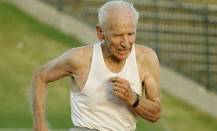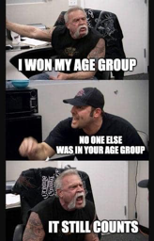
The Challenge of Aging
Are you over 40 years old? 50? Will you be 40 someday? Are you a day older than yesterday? Thought so. In that case, you need to read this because we’re all aging, like it or not!
Let me get right to the point. I’m writing this as a 63-year-old man who has been running since I was 22 and racing triathlons since I was 36. Do the math – that’s 41 years of running and 27 years of competing in triathlon. Training and racing through my 20s, now into my 60s, means I’ve weathered the storm of aging for over four decades. I’ve watched many friends of similar age drop out, some a long time ago as the aging process and its toll has taken them out.
No judgement here. I get it. Totally. Completely. Why? Because of the following.

SOME of the Challenges are…
1. Flexibility. This one is big. I used to be able to turn my head all the way around when cycling to look behind me for other riders, cars, etc. Not anymore. Now I have to twist my body around to see. Might seem like a small thing but, it’s a tell-tale sign that things are changing. You see people who are very elderly kind of shuffling around and that’s because we get less and less flexible as the years tick by. This of course affects everything when it comes to swimming, biking and running.
2. Balance. Here’s another one I’ve observed that starts to go away. It’s kind of hard to pinpoint, but anything that deals with balance has been compromised. I can feel it in everyday activities.

3. Weight Gain. Yep, we all understand this one, right? With each passing year gaining weight gets way easier and getting it off gets way harder. With aging comes a level of weariness not known before and that couch and clicker look better and better. So does that chocolate cake!! With aging comes a more sedentary lifestyle and again, I totally get it. But with that, comes those dreaded pounds that seem to jump on our bodies like a winter fox jumps on a mouse.
4. Loss of cardio and respiratory efficiency. Here comes that hill. You know, that one you used to fly up with your heart rate barely noticing and your lungs ignoring that incline’s effect. Not anymore. Now, that cardio unit inside your chest wants to explode and you’re looking for an oxygen mask just 100 ft. into the ascent.
5. Loss of muscle mass. Where did those muscles go? Well, look about 12 inches down. Ah ha! There they are but, wait…they don’t look like muscles anymore. Former rock-hard pecs, delts, traps and tris seem to have morphed into Jello, packed up and moved south.
6. Recovery. Remember how you used to bounce back after just a nap for that second workout of the day? Yeah, think back. Maybe way back. No more. Nope. Now, a couple of days, a few healthy meals, lots of physical therapy and two nights sleep get you ready for that next hard work out. Yes, things have changed.
7. Headspace. It’s easy and sometimes fun to think back to, “Back in the day I______!” “My PR at that distance was_____!” “I used to be able to ____!” Yes, you did. Maybe you used to be really fast! But alas, all your PRs are long gone. My running PRs went first. Then, my swimming. Lastly, cycling. Oh, yeah, weights/resistance training too including numbers of push-ups, pull-ups, etc. Adios! Au revoir! This all adds up to mild depression for some as they watch their numbers slip over the years. You’re out there running and you guess before looking at your watch and think, “This HAS to be a 7-minute mile pace!” Your watch doesn’t lie. That former 7-minute pace? Yeah, no. Your watch screams reality in your face. “No, that’s now an 8:35 pace.” Sheesh. What’s up with that?
8. Up and down workouts. So, last Wednesday you NAILED that workout! Felt amazing. Like a beast. All splits faster and easier than you’d expected! Those are what I’d call, “Breakthrough workouts!” You now know you’re at a whole different level. You’ll go even faster next workout. Wrong. You feel like crap. Horrible. Dead. Zero snap. So, you’re experiencing the ups and downs of workouts as you get older. There were far fewer of those back in the day but now, it’s like a box of chocolates right Forest?
9. Injury healing. I can take all the above and I think have pretty good attitude about it all, but this one just stinks! Man, I really struggle with the healing time that injuries now take. Blood flow and circulation just aren’t there like it was before. Get ready to take some good time off from whatever hurts when you do it. This can be extremely frustrating!

Addressing these challenges IS possible. Maybe our PRs are indeed gone but, if we train smarter not harder, we can absolutely perform at a high level as those years tick by. There are entire books written on each of these challenges I’ve mentioned and also, YouTubes, articles, podcasts, webinars, etc., so I’ll just give you my bottom-line on some of the challenges that come from aging. I won’t deal with these in exact order mentioned above, nor are they in order of importance.
- Rest. This is extremely important! A good night’s sleep is the fountain of life and it may be harder to come by with age. As the number of your days on this planet go up, so does your need for sleep. Prioritize it. Study you’re particular sleep patterns. What helps you sleep? What hurts? Follow the good, basic rules of thumb. Turn off all electronics an hour before hitting the sack. Stay away from caffeine in the evenings. Have a set time to go to bed and a set time to get up. Use sleep aids if/as recommended by your doctor. Your exercise and workouts will certainly help you sleep. Have the room dark and cool, etc. etc. etc.
- Accept the aging process and its effects on you. There is absolutely NO escaping birthdays. They happen. They mean something. Don’t live in the past. Don’t “fight” the process emotionally and let it stress you. The 40’s are NOT the 60’s. While there are lots of very significant things we can do to slow it down and maximize each season of life, we have to face that facts. (That said, there is some truth to “age is just a number.” I see some 68 yr. olds who have more life and energy than most 38 yr. olds and that’s because they take great care of themselves. A 40 yr. old can be just that – OLD. A 70 yr. old can be youthful and full of zest for life.)
- So much of this comes down to lifestyle choices. My dad played tennis in the Nebraska Sr. Games until he was almost 90. Most of the time there wasn’t even anyone in his age group still playing. Most were, well, dead. So yes, accept that you can’t do handsprings anymore but, do what you can and do it faithfully and regularly. How you chose to live the first two-thirds of your life will have a massive effect on the last third of your life and the health and quality of life you enjoy – or don’t enjoy.
- Our diets become more and more important with age. I’m a self-confessed sugar-aholic. I’m working on it, some. Eating lots of lean protein and lots of veggies (mostly raw) is a great way to go. Cut out those empty, refined sugar carbs and you’ll feel a lot better and that number on the scales may start to drop too. Using a simple calorie counting app can help you become very aware of what you’re putting down the hatch if you log everything you eat. This is THE most challenging aspect of life for me in my 60’s HANDS DOWN!
- Working on flexibility and balance may not be sexy, but man, is it important! Standing on one leg and going through a series of movements can show you quickly how much you need to work on this and I’ll bet it’s a lot. Gentle stretching and functional movement type stretching is extremely important if we don’t want to be shuffling around with a 3” stride next year. It’s one thing to know this and it’s another to do it. Get this. When I scoop the results of my dog’s dinner in the backyard, I can bend over while standing on one foot/leg to scoop it. Next pile (sorry) I stand on the other foot/leg and scoop. Each one is getting in a bit of balance work. I have a goal of being able to put on my socks in the morning, STANDING up throughout my 60’s. Now if you’re 30 and reading this, you have no grid to understand that last sentence. It’s OK. You will someday. Point is, I try to work on this stuff just in the routine of my daily activities in addition to specific, focused times.
- HIIT and Zone 2 work must be balanced. Again, books have been written on all of this but as we age, doing some High-Intensity Interval Training becomes very important. So is Zone 2 heart rate training so as to maintain and perhaps increase cardio efficiency. The ratios of time spent on each is yours to determine, or maybe your coach, if you have one. But do both and your heart and lungs will thank you.
- One of the things that has helped me to still race well as I’ve aged is more work on technique in all three sports. Swimming is a lifelong technique development sport. When on my bike, if I just think of the words, “Wipe and lift,” as it pertains to what my foot is doing at the bottom of my stroke, my speed increases by ½ mph with NO increase in perceived effort. It’s all technique. When running if I think of keeping a high cadence with my foot strike being under my body vs. in front of it and if I think about a slight forward lean from my ankles, running “tall”, I’ll run much better than if I don’t concentrate on all of those things. The more we age, the more we can gain from improved technique.
- It’s a fact that we get weaker as we age, but don’t give up. Doing resistance/strength work is one huge reason I’ve stayed competitive in my age group all these years. I started about 20 years ago and it has certainly paid off. I use mostly body weight movements, dumbbells and resistance cords to attempt to retain muscle strength and mass. The older you get the more important this becomes. Along this line, REALLY focus on lateral movements. Swimming, biking and running all keep us moving in one direction. Forward. Our primary forward-moving muscles are doing all the work and over the years, our secondary supportive muscles can waste away and muscle imbalance happens. This hit me big-time in my early 40s and so lateral movement strength and resistance work became central to what I started doing and it’s made a huge difference.

- Keep racing as you get older. Yes, your times are going to be obviously slower (just check age-group results group by group) but it’ll keep you focused and goal-oriented. And, the best workout you’ll do that week and maybe that month, will be the race. Calling on your body to really maximize itself by racing will be a boost to your health and fitness. Oh, and be sure to warm up really well before the race starts. Not warming up is the biggest mistake I’ve seen made on race day by athletes, no matter what their age.
- Keep doing what you can. The old adage, “Use it or lose it,” is absolutely true. Maybe your running days are over so you sign up for an aqua-bike or two each year. Awesome. Just do something…anything. Our bodies were made to move and an incredible feature of them is that taxing them, then letting them recover, puts them ahead of where they were before they got taxed! Sweet!
I’ve mentioned this in previous blogs, but I started racing triathlons, from a running background, when I was 37. My fastest ever sprint triathlon took place at USAT Nationals when I was in the 55-59 age group. So, keep after it. Stay faithful. Prioritize your health and fitness and you’ll be amazed at how your body can keep performing well year after wonderful year!










